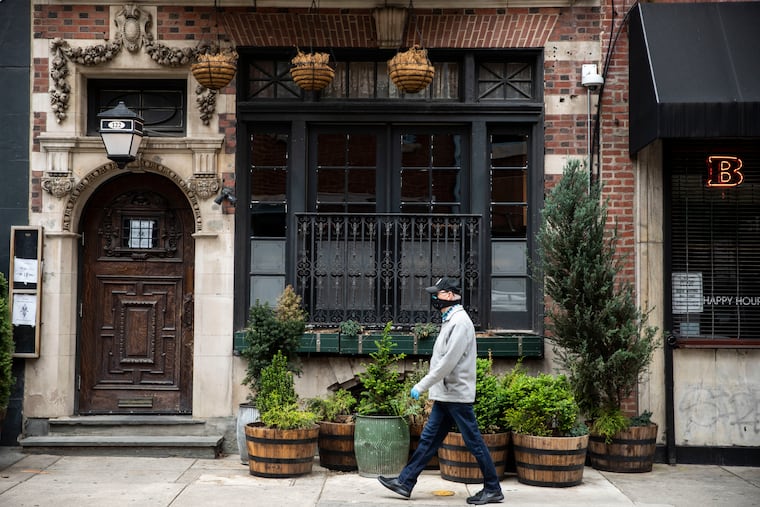Things to do (from home) this week: How to be prepared right now
And as we start a new month, there are some ways to be better prepared on what’s to come, including one simple thing you can do right now for your peace of mind, and, possibly, for your future wellbeing.

April has started and ended, for many of us, in isolation. And as we start a new month, there are some ways to be better prepared on what’s to come, including one simple thing you can do right now for your peace of mind, and, possibly, for your future well-being. But before we get there:
We’ve got the best online events and streams this week, including the Love from Philly fest, a Beastie Boys’ doc, and the comedy we all need right now from Will Ferrell, Bryan Cranston, Patton Oswalt, Jack Black and others. Get the full list at inquirer.com/calendar.
We have a *new* calendar, too, and it’s all about keeping your kids occupied when you’re trying to work. Our new kids calendar is updated every Sunday morning, with activities for the week ahead. And you can always find it at inquirer.com/kidscalendar
Want to go outside? Here are some resources for how to do things safely: How to go camping, hiking, and fishing. More on how to do things now at inquirer.com/topic/do-this
Stay healthy, stay safe, and, as much as possible, stay home.
How to do this now: Masks
How to wear a mask and avoid fogging up your glasses by Nick Vadala
Summer and masks: How to wear face masks in hot weather by Nick Vadala
Face masks for kids: How to get your kids to wear them (properly) by Grace Dickinson
How to clean your fabric face mask to help prevent getting the coronavirus by Nick Vadala
Fashion face masks: Buy a stylish mask from one of these local designers by Brandon T. Harden
How to wear a mask while running, biking or exercising outdoors by Grace Dickinson
» TELL US: What would help make your life easier right now? Email us at thingstodo@inquirer.com.
Do this nice thing this week
Do you have a friend on the front lines? The coronavirus pandemic is a different experience for essential workers right now. (If you’re the one on the front lines: Thank you.) Elizabeth Wellington has gathered some practical, useful ways to help support friends, family and neighbors who are out there doing the work right now. Read her whole piece here, but here’s some useful places to start:
Run the errands. Pick up groceries, do some cooking, whatever you can to lighten the load. “This is not the time to add responsibility to their loads,” says Dr. Lynette Charity, a physician who lectures on the effect of mental stress and burn out on physicians.
Pay attention. If you notice your friend becoming more forgetful, changing their hygiene habits or spending too much time alone, those could be signs of burnout. Reach out and see how you can help.
Send a text to check in. “We feel like no one cares about us,” says Rebecca Jacobs, a nurse at Jefferson Health in Vorhees. “Some of the nicest notes of encouragement I got were short texts from friends."
Find a way to pamper them. Send a pizza, or a lasagne, or cookies: something to make them feel like they’re getting the hug you can’t give them in person right now.
» READ MORE: How to help essential workers avoid burnout
Prepare this
Pack a bag: Hopefully you won’t need it. But if you do get sick, taking this simple step now can help not just with your comfort while you’re in the hospital, but it can help you get better care, Elizabeth Wellington writes. Do it now, leave it by the door or put it in the car. It’s a little bit of peace of mind.
Here’s what to pack:
An advance medical directive, which is a document that names your health care proxy — the person who will make medical decisions on your behalf in the event that you can’t. (You can download one online here.)
A list of your medications, and dietary restrictions so health care providers know what you need.
A list of contacts for friends and family. “If medical providers can’t access your contacts, then they can’t let people know that you are OK,” says Dr. Rebecca Sudore, a geriatrician, palliative caregiver, and the creator and director of Prepare for Your Care
Spare glasses or hearing aids, if you use either, which are important to making sure you can communicate with staff.
Also a good idea to pack: an extra pair of clean clothes, phone charger, magazine/book, toothbrush, sleep mask and some cash.
» READ MORE: To do: Pack a hospital bag now in case you get sick
Make this
Need some support in the kitchen? Here are some resources for you:
GOT KIDS? What to cook with your kids, from Philly chefs who have kids by Grace Dickinson
NEED HELP? Where to find free food right now if you need it by Marc Narducci
TIME FOR HAPPY HOUR? Bartenders pick 6 bottles of booze to buy from reopened Pa. liquor stores by Jenn Ladd